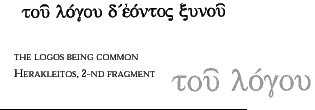
[an error occurred while processing this directive]

Logic...
For long, from the Ancients on, logic as a discipline has been concerned with the rules of valid inference and meaning, abstractly conceived. Thus, inference patterns are classified as valid if they are set up according to strict laws of reasoning, or if the reached conclusions are forced, according to such laws, by preceding premises. For example, a classical line of reasoning is that of modus tollens:
- if P, then Q
- not Q
- so, not P
Similarly, a notion of validity or entailment has also been classified in terms of meaning or truth-conditions. A sequence of premisses is said to entail a certain conclusion if the latter is true in all the models or possible worlds in which the premises are true. If it is inconceivable that there is a situation in which the premises are true, and not the conclusion, then it is deemed a logical conclusion.
However, logic in its colloquial sense is an enterprise
encompassing more than the rules of correct reasoning only.
People say, for instance, that they don t understand the logic
of this printing device, and talk about the investor's logic,
or parental logic, etc. Also, the semi-productive suffix
-logic appears to relate to more than the domain of valid
reasoning, as it appears in psychological considerations,
polemological motivations, chronological variations, and, if
you want, egological or agnostological limitations . Last but
not least, the term logic is etymo-logically related to the
Greek word  ,
which was used for a wide variety of concepts
such as language, understanding, reason, doctrine, structure,
and principle. It appears that logic, basically, is not just
concerned with the patterns of valid inference, but with the
ways in which cognitive human agents structure their interaction
with their immediate natural habitat (which includes other
agents).
,
which was used for a wide variety of concepts
such as language, understanding, reason, doctrine, structure,
and principle. It appears that logic, basically, is not just
concerned with the patterns of valid inference, but with the
ways in which cognitive human agents structure their interaction
with their immediate natural habitat (which includes other
agents).
The last century has witnessed an increasing tendency in which logic recaptures its initial, more ambitious, scope. Although logic as a discipline, in the division of labour between the major disciplines of (Western) thinking, has traditionally been granted the rules of inference only and although it has fallen asleep for ages every now and then it has woken up in the late 19-th century with the work Boole and Frege, and it has revived and grown strong in the second half of the last century. Nowadays, and also most explicitly in the Logic in Action project, logic has an open eye for the phenomenon of information management, and it gets applied in other rule-governed contexts than that of reasoning only: in mathematics (calculation rules), in linguistics (dialogue and interpretation rules), in natural language processing (rules of computation), and recently logic reasoning is also located in the context of action and decision (rules of the games people play).
This last point relates to another classical logico-philosophical issue, concerned with how good the world is, and what we can do about that.